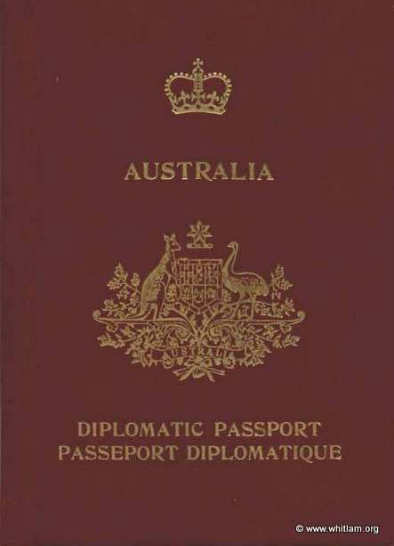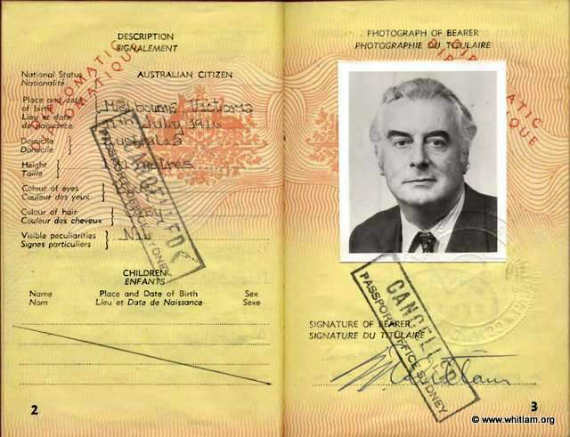Diplomatic Passports of Gough Whitlam
Diplomatic Passports Gough Whitlam
Some time ago I was asked to support the evaluation of these outstanding Diplomatic Passport Collection of Gough and Margaret Whitlam – Ex-Prime Minister of Australia 1972-1975. It is fantastic to see that the University of Western Sidney – Whitlam Institute is bringing this collection to the public. It was my great pleasure to be part of this project. I wish more organizations worldwide would handle such significant documents as it was done here. Please enjoy the article and the gallery. Thank you, Adrienne (Valuer of manuscripts & art) and Lorraine (whitlam.org) for the collaboration. Diplomatic Passports Gough Whitlam
The Whitlam passports have been donated by the Whitlam Family as part of the University of Western Sydney’s Whitlam Institute collection of material from the life and times of the Hon Gough Whitlam, AC QC former Prime Minister of Australia from 5 December 1972 to 11 November 1975. The passports are mainly from the time when Mr. Whitlam was based in Paris as Permanent Delegate to UNESCO, Hon EG Whitlam AC QC (Aug 1983 to October 1986) and as Member of the UNESCO Board, Hon EG Whitlam AC QC (October 1985 – November 1989).



Edward Gough Whitlam AC QC ( 11 July 1916 – 21 October 2014) was the 21st prime minister of Australia, in office from 1972 to 1975. The longest-serving federal leader of the Australian Labor Party (ALP), he was the head of a reformist administration that ended with his removal as prime minister after controversially being dismissed by the governor-general of Australia, Sir John Kerr, at the climax of the 1975 Australian constitutional crisis. Whitlam is the only Australian prime minister to have been removed from office in this manner. Diplomatic Passports Gough Whitlam
Whitlam served as an air navigator in the Royal Australian Air Force for four years during World War II and worked as a barrister following the war. He was first elected to the Australian House of Representatives in 1952, becoming a member of parliament (MP) for the division of Werriwa. Whitlam became deputy leader of the Labor Party in 1960, and in 1967, after the retirement of Arthur Calwell, was elected leader of the party and became the Leader of the Opposition. After narrowly losing the 1969 federal election to John Gorton, Whitlam led Labor to victory at the 1972 election, after 23 years of continuous Coalition government. Diplomatic Passports Gough Whitlam
FAQ Passport History
Passport collection, passport renewal, old passports for sale, vintage passport, emergency passport renewal, same day passport, passport application, pasaporte passeport паспорт 护照 パスポート جواز سفر पासपोर्ट
1. What are the earliest known examples of passports, and how have they evolved?
The word "passport" came up only in the mid 15th Century. Before that, such documents were safe conducts, recommendations or protection letters. On a practical aspect, the earliest passport I have seen was from the mid 16th Century. Read more...
2. Are there any notable historical figures or personalities whose passports are highly sought after by collectors?
Every collector is doing well to define his collection focus, and yes, there are collectors looking for Celebrity passports and travel documents of historical figures like Winston Churchill, Brothers Grimm, Johann Wolfgang von Goethe. Read more...
3. How did passport designs and security features change throughout different periods in history, and what impact did these changes have on forgery prevention?
"Passports" before the 18th Century had a pure functional character. Security features were, in the best case, a watermark and a wax seal. Forgery, back then, was not an issue like it is nowadays. Only from the 1980s on, security features became a thing. A state-of-the-art passport nowadays has dozens of security features - visible and invisible. Some are known only by the security document printer itself. Read more...
4. What are some of the rarest and most valuable historical passports that have ever been sold or auctioned?
Lou Gehrig, Victor Tsoi, Marilyn Monroe, James Joyce, and Albert Einstein when it comes to the most expensive ones. Read more...
5. How do diplomatic passports differ from regular passports, and what makes them significant to collectors?
Such documents were often held by officials in high ranks, like ambassadors, consuls or special envoys. Furthermore, these travel documents are often frequently traveled. Hence, they hold a tapestry of stamps or visas. Partly from unusual places.
6. Can you provide insights into the stories behind specific historical passports that offer unique insights into past travel and migration trends?
A passport tells the story of its bearer and these stories can be everything - surprising, sad, vivid. Isabella Bird and her travels (1831-1904) or Mary Kingsley, a fearless Lady explorer.
7. What role did passports play during significant historical events, such as wartime travel restrictions or international treaties?
During war, a passport could have been a matter of life or death. Especially, when we are looking into WWII and the Holocaust. And yes, during that time, passports and similar documents were often forged to escape and save lives. Example...
8. How has the emergence of digital passports and biometric identification impacted the world of passport collecting?
Current modern passports having now often a sparkling, flashy design. This has mainly two reasons. 1. Improved security and 2. Displaying a countries' heritage, icons, and important figures or achievements. I can fully understand that those modern documents are wanted, especially by younger collectors.
9. Are there any specialized collections of passports, such as those from a specific country, era, or distinguished individuals?
Yes, the University of Western Sidney Library has e.g. a passport collection of the former prime minister Hon Edward Gough Whitlam and his wife Margaret. They are all diplomatic passports and I had the pleasure to apprise them. I hold e.g. a collection of almost all types of the German Empire passports (only 2 types are still missing). Also, my East German passport collection is quite extensive with pretty rare passport types.
10. Where can passport collectors find reliable resources and reputable sellers to expand their collection and learn more about passport history?
A good start is eBay, Delcampe, flea markets, garage or estate sales. The more significant travel documents you probably find at the classic auction houses. Sometimes I also offer documents from my archive/collection. See offers... As you are already here, you surely found a great source on the topic 😉
Other great sources are: Scottish Passports, The Nansen passport, The secret lives of diplomatic couriers
11. Is vintage passport collecting legal? What are the regulations and considerations collectors should know when acquiring historical passports?
First, it's important to stress that each country has its own laws when it comes to passports. Collecting old vintage passports for historical or educational reasons is safe and legal, or at least tolerated. More details on the legal aspects are here...
Does this article spark your curiosity about passport collecting and the history of passports? With this valuable information, you have a good basis to start your own passport collection.
Question? Contact me...

